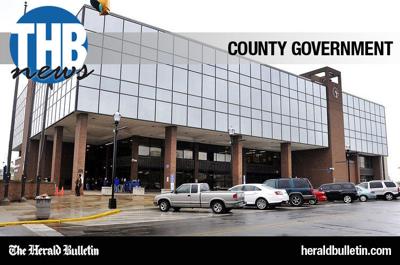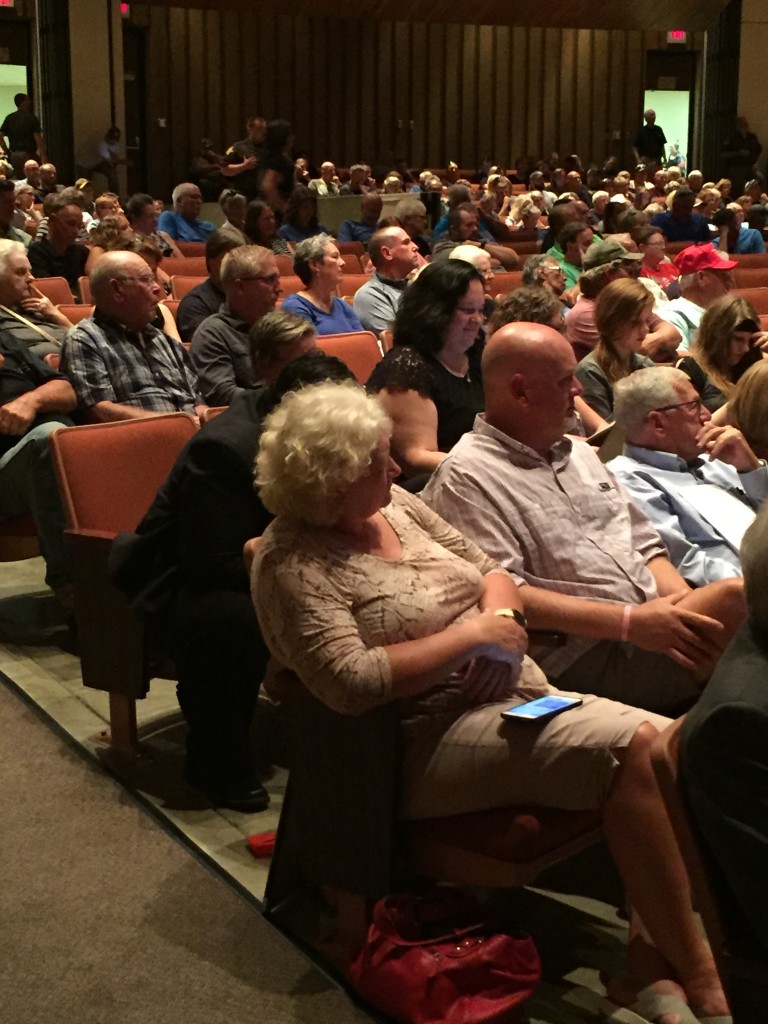To view the full report https://www.in.gov/iurc/files/2019%20Q2%20Net%20Metering%20Quarterly%20Reporting%20Summary.pdf
To view the full report https://www.in.gov/iurc/files/2019%20Q2%20Net%20Metering%20Quarterly%20Reporting%20Summary.pdf

ANDERSON – A request for a 10-year tax abatement for the proposed Lone Oak Solar Energy Center was defeated Tuesday by the Madison County Council.
The County Council voted 4-3 to deny the requested tax abatement.
Opponents applauded the outcome of the vote at the Madison County Government Center.
The denial of the tax abatement could leave the fate of the project unknown as Invenergy officials, developer of the project in northern Madison County, said it was needed to move forward.
Invenergy was seeking a 100% tax abatement once the proposed $110 million project is completed and generating 120 megawatts of electricity. The company requested the traditional 10-year abatement.
Council President Anthony Emery said he feels for the people living in the area of the proposed project.
“We have two questions,” he said. “Does it meet the economic revitalization area designation and the fiscal condition of the county?”
Emery said he was opposed to the tax abatement request for the project.
Councilman Jerry Alexander said the project was approved and it was determined to be a viable project.
“Landowners have the right to lease their land,” he said.
Councilman Pete Heuer said he has seen the company’s business plan and it indicated a need for the tax abatement.
But in the end, Heuer joined Emery, Steve Sumner and Brent Holland in voting against the abatement.
The company promised to make a $1 million payment to the county as early as 2021 or once the project is completed. That amount was increased from an initial $850,000.
Katya Samoteskul, lead developer on the Lone Oak Solar Energy Center, said the tax abatement was needed because it impacted the price of power. Samoteskul explained a contract is signed for the sale of the electric power and then obtain a construction loan.
“With no tax abatement, it will increase the cost of providing power,” she said. “That will impact the possible construction of the project.”
A financial analysis by Baker Tilley Municipal Advisors for the project said the tax abatement will save the company $5 million over 10 years. The project will pay $24.2 million in taxes during the tax abatement period.
Opponent Debbie Spooner questioned the designation of the area as an economic revitalization area.
“Is this an economic revitalization area?” she asked. “Did the council conduct an investigation of the area as an economic revitalization area?”
Spooner said if the project is approved the impacted property owners will appeal their assessed value, which could reduce in lower property tax payments to the county.
Attorney Mary Solada, representing Invenergy, said the Indiana State Board of Accounts has never determined a renewable energy project didn’t qualify as an economic revitalization area.
The Madison County Board of Zoning Appeals voted earlier this year to approve two special exceptions for the development.
The BZA in May approved a special use for the Lone Oak Solar Energy Center on 850 acres.
The company said the additional acreage was required because the BZA set a 500-foot setback from nonparticipating land owners’ property lines.
A 10-year tax abatement was approved in 2011 when E.on developed its wind farm in northern Madison County. In exchange, the company provided $1.3 million to Madison County for economic development.

Henry County Planning Commission hearing 7/23/19. Photo by Laura Ann Arnold
It’s been just about two months since the Henry County Planning Commission did not approve a wind farm request.
Thursday, the planning commission members made it official: they have denied a request from Big Blue River Wind Farm.
The wind farm company originally asked for a commission approved use (CAU) to move forward with a project of 38 turbines in northwestern Henry County.
The planning commission hosted a public hearing July 23 at Bundy Auditorium and listened to comments for and against the project.
At the end of that July meeting the planning commission voted 4-4 on the CAU request. Because the vote didn’t receive a majority either way, Zoning Administrator Darrin Jacobs declared the request “not approved.”
Since that meeting, county attorneys have been reviewing the planning commission’s action, trying to determine if the CAU had actually been denied.
The planning commission formally passed a Findings of Fact and Decision on the matter Thursday.
With a vote of 6-0, the Henry County Planning Commission voted “an application that fails to receive a majority approval is deemed denied.”
Because the CAU was denied, Big Blue River Wind Farm has to wait at least one full year before reapplying for the same request.
The only exception would be if new evidence or “a mistake of law or fact significantly affecting the prior denial” was brought to the planning commission.
Planning commission member Olene Veach abstained from the vote and member Rachel Clark was not present.
The planning commission also passed a Findings of Fact and Decision with a vote 7-0 to affirm their previous July 30 approval of a CAU request from Boar’s Head Provisions.
The Boar’s Head request was to operate an additional food processing facility on County Road 400S, across the street from its two current properties.
In other business, the planning commission determined that resolution from the Middletown Redevelopment Commission conformed to Middletown’s development plan.
The Henry County Planning Commission meets again at 5 p.m. Thursday, Oct. 17 at the Henry County Courthouse, 101 S. Main St., New Castle.

The Kentucky Public Service Commission (PSC) has extended the time for comments on the implementation of a recent law that will change the way in which Kentucky electric utility customers receive credit for electricity they generate from solar panels and other renewable sources.
In an order issued last week, the PSC granted a request by Kentuckians for the Commonwealth to allow more time for comments and to postpone a planned hearing in the case.
Written comments in the proceeding now are due by October 15, twenty-five days later than the original deadline.
The PSC hearing to receive comments in person will be held at 9 a.m. EST on November 13 at the PSC offices in Frankfort, six weeks later than the original date.
The case was established in July to gather information that would be useful in future rate cases that will determine net metering rates for electric utilities. The PSC will make no decisions on net metering rates in this proceeding.
The Kentucky General Assembly earlier this year passed and Gov. Matthew Bevin signed into law a bill that changes the way utilities will credit retail customers who generate electricity from renewable sources, primarily solar panels.
Under the new law, net metered customers will receive dollar credits at a compensation rate set by the PSC in rate proceedings for each utility, with the compensation amount for each billing period subtracted from the total bill for that period. The new law states that an electric utility is “entitled to implement rates to recover from its eligible (net metering customers) all costs necessary to serve” those customers, independent of the rate structure for all other customers.
The original net metering statute provided credits at the full retail rate, using a bi-directional meter that reflected whether a customer was producing more or less electricity than was being used. The customer bill reflected the net usage.
The new law takes effect on January 1, 2020. After that date, utilities may file applications with the PSC to implement new net metering rates. The new rates will take effect only after receiving PSC approval.
Homes and businesses which began receiving net metering service under the prior statute and rates will continue to do so for 25 years from the date at which net metering began. The 25-year period will not be affected if the property is sold.
Investor-owned electric utilities – Duke Energy Kentucky, Kentucky Power Co., Kentucky Utilities Co., Louisville Gas & Electric Co. – will have to file individually to adjust their net metering rates. Kentucky’s two generation and transmission cooperatives – Big Rivers Electric Corp. and East Kentucky Power Cooperative – may file on behalf of one or more of their distribution cooperatives or distribution cooperatives may file individual applications.
In the order establishing the case, the PSC said it will use the comments to develop a record that will be incorporated into the initial rate proceedings filed by utilities. The final order in this case will include a report summarizing the information received.
Each utility’s new net metering rate will be established based on its particular circumstances, considering both the evidence in each case and the record of the current proceeding.
All comments should cite the case number and include the commenter’s name and address. The case number is 2019-00256.

KYSEIA The Kentucky Solar Industries Association
FOR IMMEDIATE RELEASE Aug. 26, 2019
MEDIA CONTACT:
Carla Blanton
carlablantonconsulting@gmail.com
859-608-4850
FRANKFORT – The Kentucky Solar Industries Association (KYSEIA) today urged solar customers and advocates to submit comments on net metering to the Kentucky Public Service Commission (KYPSC).
With the passage of Senate Bill 100 during the 2019 legislative session, new solar customers are no longer guaranteed a one-to-one credit for excess solar power generation they send back to the grid – a process called net metering. The law directs the Public Service Commission to decide how much credit these solar customers receive for their power. That amount can change with each new rate case.
The KYPSC put out a request for written comments, which are due Sept. 20, and scheduled a public hearing on Oct. 1 as it determines how SB 100 should be implemented.
Comments can be emailed to psc.info@ky.gov. All emails should have case number 2019-00256 in the subject line and the customer’s full name and home address in the body of the email.
“Senate Bill 100 creates new red tape for Kentucky homeowners and businesses seeking to use solar energy,” said Matt Partymiller, president of the association and co-owner of Solar Energy Solutions, which is based in Lexington. “This next step in the process is the best way to mitigate the negative impact of the new law. We urge people to contact the PSC to make their voices heard.
“The PSC still has the opportunity to support the small businesses, homeowners, farmers and churches who want to choose solar power. It can accomplish this through setting a fair rate based on the true value of solar energy. The PSC also should allow a solar representative to intervene in future rate cases. The large monopoly utilities shouldn’t be the only industry voice represented at those hearings.”
Partymiller added the smaller-scale solar projects that use net metering are done mostly by small, locally owned and operated businesses.
“Onerous regulations and unfair rates for future net metering customers not only threatens Kentuckians’ ability to choose how they get their power, it also hurts solar industry jobs, which are the fastest growing occupation in the United States,” he said.
###
The Kentucky Solar Industries Association represents businesses involved in the nation’s leader in new power generation -- the solar industry. KYSEIA’s objective is to provide leadership and promote sound policy in the Commonwealth as our power sector enters the solar-age. KYSEIA understands that free market policies pursued over the past two decades are revolutionizing the nation’s power grid and creating more affordable energy. KYSEIA wants to ensure lower cost energy is available for all and ensure that all can participate in the benefits of solar growth in the Commonwealth.
Formed in 2017, KYSEIA members coalesced to ensure private citizens had continued access to Kentucky’s electric grid via Kentucky’s net-metering statute. KYSEIA unites businesses across the solar vertical including the contractors responsible for building solar arrays, the developers creating new power plants, the manufacturers crafting innovative products, and the many businesses that support the industry.
KYPSC Order available at
https://psc.ky.gov/pscscf/2019%20Cases/2019-00256//20190730_PSC_ORDER.pdf
Case at:
https://psc.ky.gov/PSC_WebNet/ViewCaseFilings.aspx?Case=2019-00256